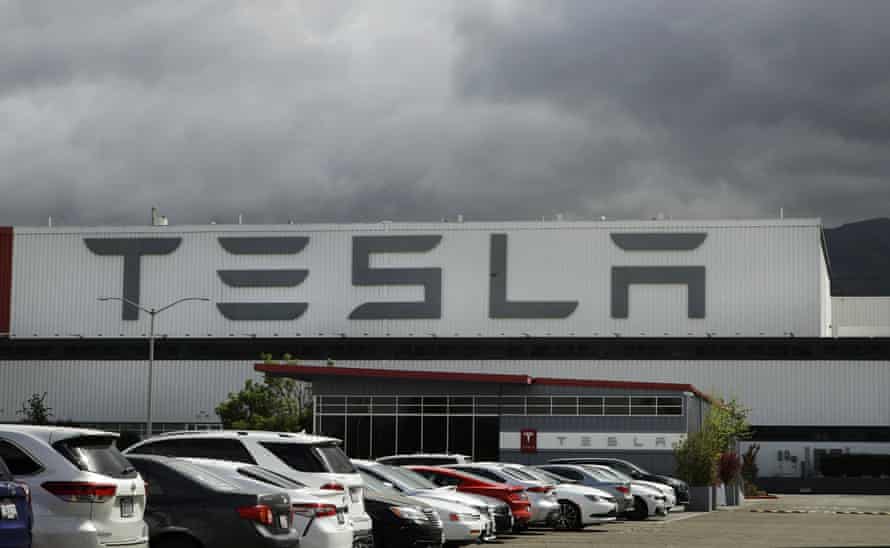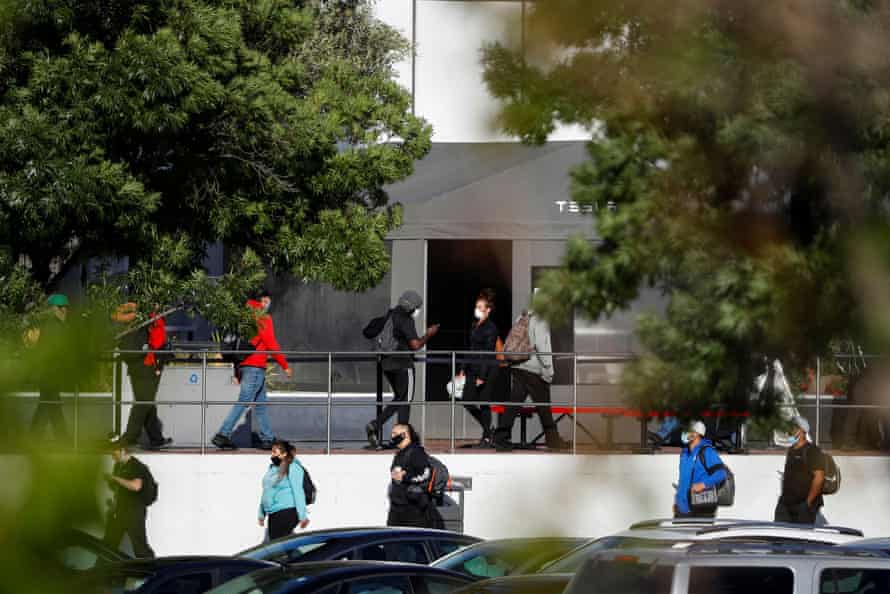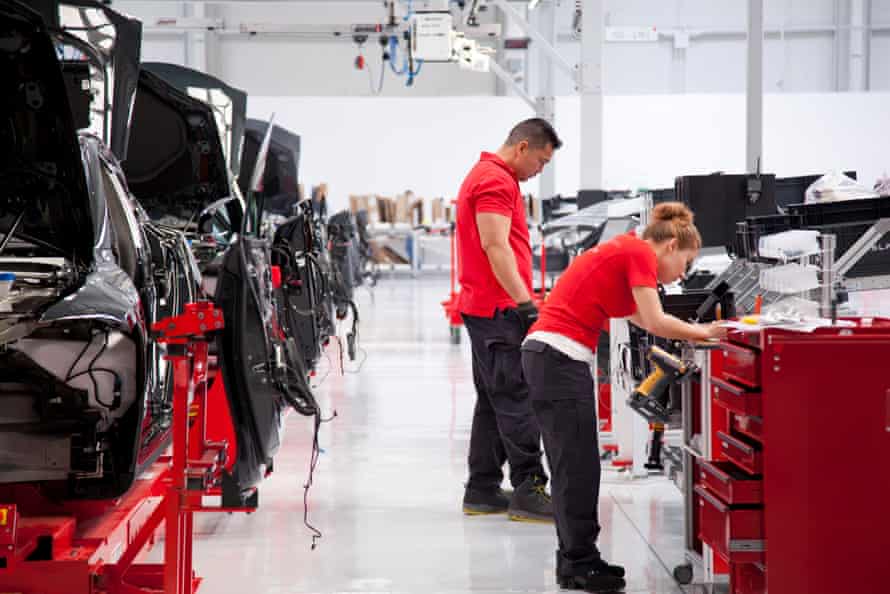
For Black employees at Tesla’s flagship California plant, coming into work could mean being harassed, bullied by a supervisor or finding racist graffiti sprayed on factory walls.
That’s according to a new lawsuit filed by California’s Department of Fair Employment and Housing (DFEH), which alleges that Black workers in the company’s Fremont factory experienced “rampant racism” that the company left “unchecked for years”.
In the suit, filed on 9 February in an Alameda county court in California, the agency says Black workers reported they were subjected to racist slurs and drawings and were assigned the most physically demanding jobs. “Workers referred to the factory as the ‘slaveship’ or ‘the plantation’, where defendants’ production leads ‘crack the whip’,” the agency said in the complaint.
“Tesla has continued to deflect and evade responsibility,” the lawsuit adds. “While it claims to not tolerate racial harassment or discrimination at its factories, Tesla’s investigations of complaints are not compliant with law.”
Allegations of racial discrimination at Tesla’s US facilities aren’t new. The company has been hit with several discrimination lawsuits from employees over similar allegations in recent years. But filed by a government agency, the new suit may have far wider implications.
“When a single worker sues Tesla, the company may be motivated to sweep the allegations under the rug. But here, the potential for actual, systemic change is much greater,” said Veena Dubal, labor law professor at the University of California, Hastings College of the Law.


Tesla has called the lawsuit “misguided” in a public blog post, noting that it focuses on alleged misconduct that took place between 2015 and 2019, but that in more recent years the DFEH has dismissed dozens of individual discrimination complaints against the company.
The company said it does not tolerate harassment and has disciplined and fired workers who engaged in misconduct. “A narrative spun by the DFEH and a handful of plaintiff firms to generate publicity is not factual proof,” Tesla said.
The company, which has disbanded its media relations department, did not respond to additional requests for comment.
The case is just the latest spat between the carmaker and US regulators. “At a time when manufacturing jobs are leaving California, the DFEH has decided to sue Tesla instead of constructively working with us,” the company said in its blogpost.
Earlier this week, Tesla CEO Elon Musk accused federal regulators of unfairly targeting Tesla, saying in a recent filing that the Securities and Exchange Commission has engaged in “outsized efforts” to monitor the company that “seem calculated to chill its exercise” of free speech.
The claims
The claims center around allegations in Tesla’s Fremont factory in the San Francisco Bay area. Black workers at the facility were subjected to “offensive racial harassing conduct so severe and pervasive that it created a hostile work environment”, according to the 39-page complaint from DFEH.
Many workers reported derogatory comments came directly from their superiors, the agency writes. One Black worker reported hearing racial slurs as often as 50-100 times a day, being called the “N-word”, and “hood rats”, according to the complaint.
Others workers told of racist graffiti found in factory common areas, including swastikas, KKK, the N-word, and other racist writing that Tesla did not remove for months at a time, according to the suit.
Black workers reported being assigned difficult, menial jobs in segregated areas of the factory known as “the dark side”, DFEH also says, and are less likely to be promoted to management positions.


“For many Black workers, the stress from the severe and pervasive racial harassment, the risk of a physical altercation and escalation with harassers, the blatant discrimination, the disproportionately severe discipline, and the futility of complaining, made the working conditions so intolerable that they resigned,” the complaint says.
Years of complaints
The complaint also alleges Tesla has been ignoring “years of complaints from Black workers.”
“These numerous complaints by Black and/or African American workers about racial harassment, racial discrimination, and retaliation lodged over a span of almost a decade have been futile,” the lawsuit reads.
A diversity report published by Tesla in December 2020 showed employees identifying as Black and African American make up 10% of its US workforce, but only 4% of employees at director level. Employees who identified as Hispanic and Latino employees make up 22% of the total workforce, but represent only 4% of employees at the director level and above.
According to the DFEH complaint, Tesla’s human resources department is “understaffed and inadequately trained”, leading to a failure to address complaints by workers. In 2020, the company had one HR professional for every 740 employees, DFEH said.
“One Black worker stated that immediately after she complained about race harassment, [Tesla] human resources official texted her harasser, who was also her supervisor, about her complaint against him,” the complaint says.
Lawsuits pile up
Last week’s filing is just the latest in a number of discrimination lawsuits to hit what has become the world’s most valuable automaker.
A federal jury in October awarded $137m to Owen Diaz, an employee at the Fremont plant in 2015 and 2016 who said managers ignored his complaints about repeated racial harassment including slurs and swastikas scrawled on bathroom walls. A judge in that case is considering Tesla’s bid for a new trial or to lower the award, which is one of the largest in a discrimination lawsuit by a single worker.
In December, six female plaintiffs working in plants across the US alleged that they experienced physical assaults, harassment, and catcalling at Tesla facilities. Another female employee made similar claims in a lawsuit filed in November.
“The through line for all of these lawsuits is the systemic nature of the harassment and discrimination in Tesla’s workplace,” said attorney David A Lowe, a partner at the firm representing the women. “The extent of the complaints show that it is a widespread, egregious problem – it’s clearly not just a couple of bad apples.”
The company is also still fighting a lawsuit filed in 2017 by Marcus Vaughn, yet another employee at the same Fremont factory who alleged he was repeatedly called the “N-word” by managers and co-workers. Vaughn also claims he was fired for “not having a positive attitude” when he brought complaints about the treatment to HR.


A judge in 2018 rejected Tesla’s bid to force Vaughn’s case into arbitration. Tesla has also moved to force the recent sexual harassment case into arbitration, a motion that will be ruled on in coming weeks. Tesla has denied wrongdoing in all cases, and has said it has implemented various policies in recent years to prevent racist conduct and punish it when it does occur.
“Our company has more than 33,000 employees, with over 10,000 in the Fremont factory alone, so it is not humanly possible to stop all bad conduct, but we will do our best to make it as close to zero as possible,” Tesla said regarding the case filed by Vaughn.
Why this is different
While DFEH’s suit may not be the first discrimination suit filed against Tesla, it may be the most consequential, said Dubal, the labor law professor.
That’s because the agency is not bound by agreements most Tesla employees have signed to bring legal claims in arbitration rather than court. “While an individual suing may be sent to arbitration, the state will not be. This means that this lawsuit can change the alleged pattern and practice of discrimination,” said Dubal.
The department can also seek the same kind of relief as workers who file lawsuits, including court orders barring future discrimination and money damages. Such penalties can be significant: in December, gaming company Riot Games agreed to pay $100m to settle a sex discrimination lawsuit by the agency.
Tesla is accused of violating the Fair Employment and Housing Act and the California Equal Pay Act, and could face fines of millions of dollars in addition to enforced changes to internal policies.
The company may also be required to provide back pay to employees who say they were unfairly compensated for their work due to discrimination.
The odds do not look good for Tesla, said Dubal. State agencies have “limited resources” and typically only take on cases where “there is very clear evidence” of wrongdoing and they are “very likely to win”, she said.
“There are many issues with racial discrimination in Silicon Valley – from executive suites to the factory workers,” she said. “This shows state enforcement agencies are listening to what people are experiencing and going after these companies.”
- Reuters contributed to this report.


